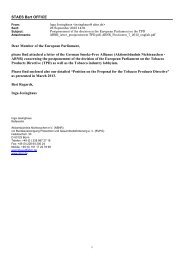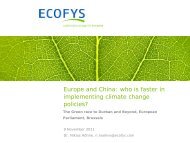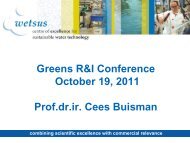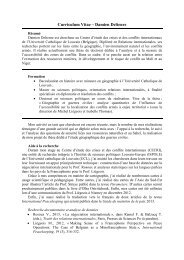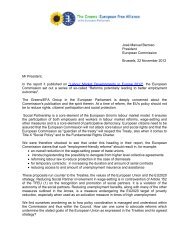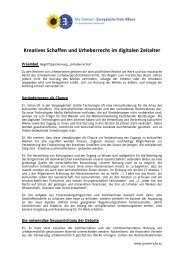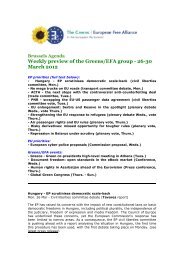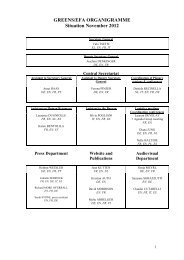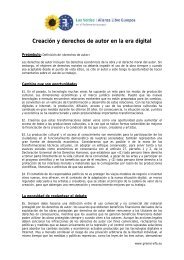Agro-Biotechnology: - The Greens | European Free Alliance
Agro-Biotechnology: - The Greens | European Free Alliance
Agro-Biotechnology: - The Greens | European Free Alliance
You also want an ePaper? Increase the reach of your titles
YUMPU automatically turns print PDFs into web optimized ePapers that Google loves.
42 | Cloned farm animals - a ‚killing application‘? |<br />
In addition another WTO agreement, the Agreement on Trade-Related Aspects<br />
of Intellectual Property Rights (TRIPS), allows measures necessary to protect<br />
ordre public or morality. Article 27 (Patentable Subject Matter) says<br />
"(2) Members may exclude from patentability inventions, the prevention within<br />
their territory of the commercial exploitation of which is necessary to protect<br />
ordre public or morality, including to protect human, animal or plant life or<br />
health or to avoid serious prejudice to the environment, provided that such<br />
exclusion is not made merely because the exploitation is prohibited by their<br />
law." 49<br />
<strong>The</strong> third example showing that morality is a relevant category under the<br />
WTO is taken from a speech by the Director General of the WTO, Pascal Lamy.<br />
While speaking about the moral and ethical responsibility to preserve the flora<br />
and fauna Lamy said:<br />
"Today, more than ever before, we have become conscious of the fact that<br />
we do not simply live on a planet, but live on what is itself a “living planet”.<br />
<strong>The</strong>re are many reasons why that planet needs to be kept alive. First, is the<br />
wellbeing of the human race – which cannot itself thrive in an unhealthy<br />
ecosystem. But, second, is our moral and ethical responsibility to preserve the<br />
flora and fauna on whose habitats we intrude as we construct our own. <strong>The</strong><br />
preservation of our biological diversity is a responsibility that we owe not only<br />
to this generation, but to future generations too." 50<br />
While the history of WTO dispute settlement cases and the interpretation of<br />
existing trade laws by the WTO member states shows that environmental,<br />
health or ethical concerns are not favoured, there is nothing in general in the<br />
WTO rules prohibiting "moral grounds for embargoes on goods or products<br />
from other countries". On the other hand "moral grounds" are not mentioned in<br />
two other WTO agreements which are in general relevant for food products: the<br />
Agreement on the Application of Sanitary and Phytosanitary Measures (SPS<br />
Agreement) and the Agreement on Technical Barriers to Trade (TBT Agreement).<br />
<strong>The</strong> legitimacy of the WTO to force feed markets with products that are matter<br />
of deep ethical concerns and imply a high level of technical uncertainties is not<br />
set in stone. <strong>The</strong> discussion about food imports from cloned animals is likely to<br />
add to the demands and discussions about strengthening the rights of consumers<br />
against the interests of international markets. <strong>The</strong> <strong>European</strong> risk manager<br />
has in any case to take socio-economic and ethical aspects into account<br />
asp?DDFDocuments/t/wt/cte/w203.doc<br />
49 http://www.wto.org/english/docs_e/legal_e/27-trips.doc<br />
50 WTO DG Pascal Lamy at the Ministerial Segment — Panel on Biodiversity and Trade - Convention<br />
on Biological Diversity 8th Meeting of the Conference of the Parties (Cop-8)26-29 March 2006, http://<br />
www.wto.org/english/news_e/sppl_e/sppl22_e.htm



